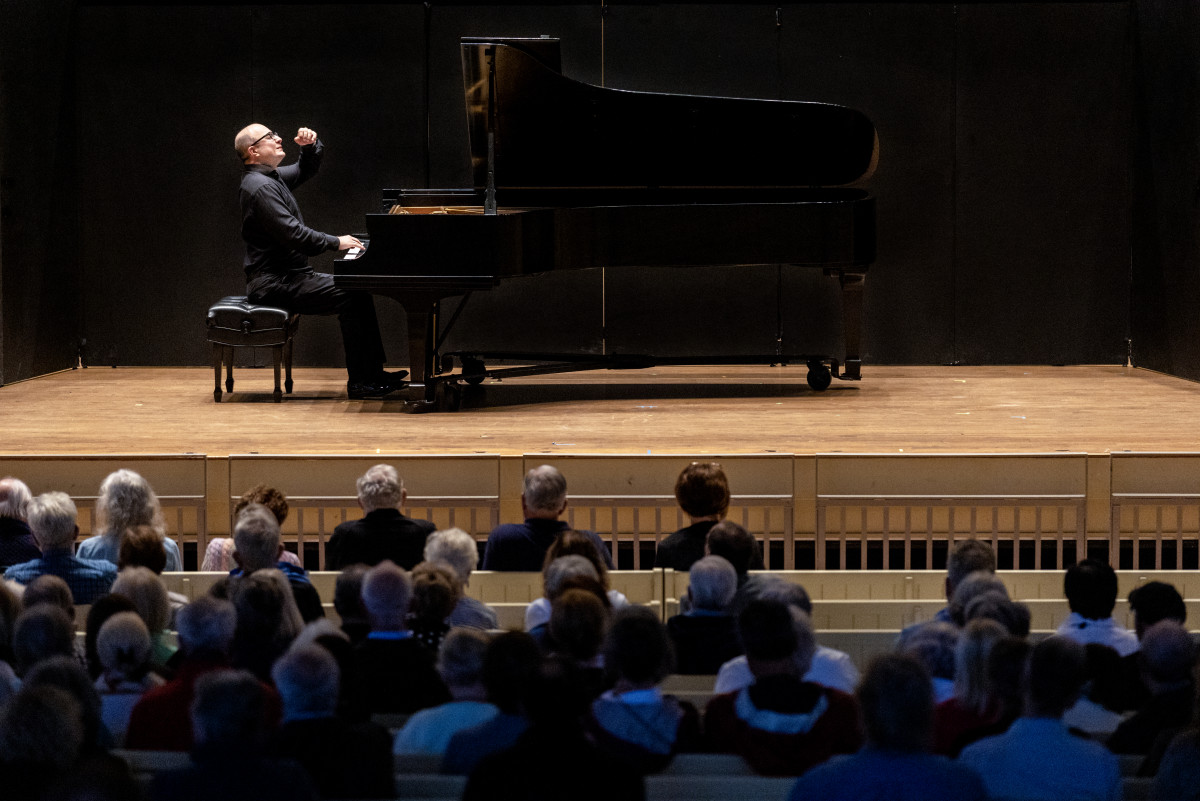
Artistic Advisor and Artist-in-Residence of the Chautauqua Piano Program Alexander Gavrylyuk performs during an evening piano recital July 31, 2023, in the Amphitheater.
Internationally renowned pianist and Artist in Residence Alexander Gavrylyuk is returning to Chautauqua’s biggest stage at 8:15 p.m. tonight in the Amphitheater for a performance featuring some of history’s most influential composers.
Gavrylyuk’s solo recital tonight will feature pieces by Mozart, Chopin, Debussy and Rachmaninoff, and the Ukrainian-born musician hopes that Chautauquans will leave the Amp holding onto a message of unity, love, and hope.
“When (Gavrylyuk) performs, he is all in,” said Deborah Sunya Moore, senior vice president and chief program officer for Chautauqua Institution. “When he performs, he is communicating with us, his audience, and it’s almost as if something sacred takes place.”
Gavrylyuk was born in Ukraine and began playing piano at the age of 7, playing his first concerto two years later.
At the age of 13, he left Ukraine for Sydney, Australia. In 1999, Gavrylyuk won First Prize and Gold Medal at the Horowitz International Piano Competition; in 2000, he won First Prize at the Hamamatsu International Piano Competition; and in 2005, he won the Gold Medal at the Arthur Rubinstein International Piano Masters Competition.
But Gavrylyuk’s accomplishments extend far beyond winning any piano competitions. He has played with 17 of the world’s most prestigious orchestras, including the New York Philharmonic, the Royal Concertgebouw Orchestra, and the Philharmonia. He’s also made appearances at some of the world’s largest classical music festivals, and has played solo recitals at venues around the world.
Throughout his career, Gavrylyuk has received extensive acclaim for his playing abilities, described as “the most compelling pianist of his generation” by Roger Woodward and “an extraordinary talent” by Vladimir Ashkenazy, both accomplished and respected pianists in their own right. Many of his contemporaries and music critics say that his talent extends beyond mere technical ability, and that his deep and intense understanding of each piece he plays is what sets him apart.
“The priority for me is to allow for the music to lead me as a performer,” Gavrylyuk said. “I surrender, so to speak, to the natural flow and the natural feeling of the music.”
He said his approach to playing music is similar to the way that actors prepare for their roles on the stage; he balances his own interpretation of each piece with the intentions of the original composer, ultimately letting the music be the thing that guides the way. His role, he says, is to serve as the lens through which the audience can see and understand the composer.
Seeing and understanding the composer is more important now than ever, in his eyes. Gavrylyuk has spoken before about his affinity for the music of Sergei Rachmaninoff, one of the composers whose music he will be playing tonight. Rachmaninoff was a Russian composer, and in the wake of the Russia-Ukraine War, many in the classical music world called for the music of Rachmaninoff and other Russian composers to stop being played.
“I find (Rachmaninoff’s) music, in a way, very liberating and very empowering,” Gavrylyuk said. “For me, this is the symbol of freedom, especially in that part of the world. When I play this music, I play about liberation, and I play about inner freedom, and every other type of freedom.”
Gavrylyuk will be closing his recital tonight with Rachmaninoff’s “Piano Sonata No. 2 in B flat minor,” preceded by Debussy’s “Two Arabesques,” four pieces by Frederic Chopin, and Mozart’s “Rondo in D.”
He hopes that Chautauquans will leave his recital with a deeper understanding of music’s power as a universal language; one that has the power to bring people closer together, and to change the world for the better.
“I think together, we can take away moments of unity, moments of pure bliss,” he said. “The feeling of inclusivity and togetherness that this music creates is a marvelous, precious state of mind.”




